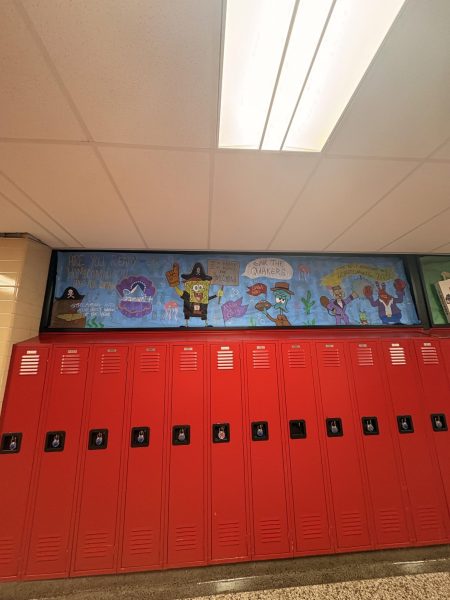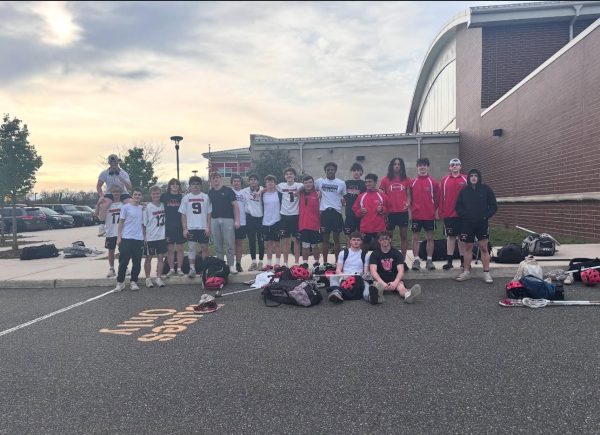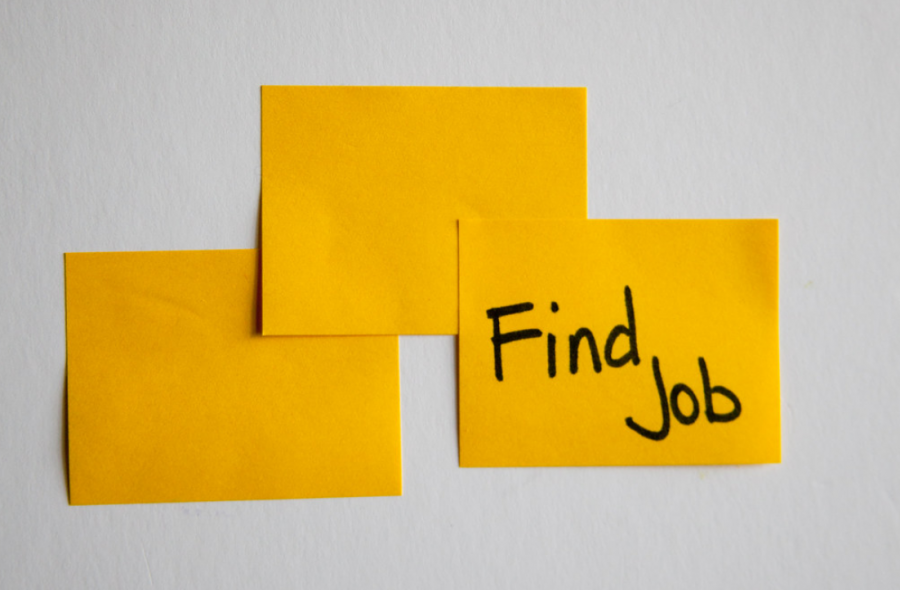Getting a Job in an Ever-Changing World
“Sticky notes – Find a Job” by flazingo_photos is licensed under CC BY-SA 2.0
Due to the recent labor shortage affecting the country, there has been an influx of job openings for students interested in looking for or applying for a job. According to the U.S. Department of Labor, “54.4% of teenagers had a job in July 2021.” While some CHS students are already a part of the percentage of employed teens, some are beginning to look for a job now.
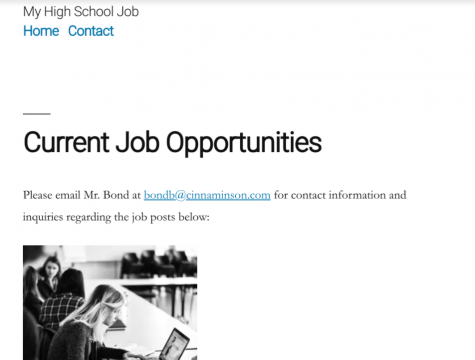
According to CHS business teacher Brandon Bond, CHS students are learning skills in their business classes that will help prepare them for a job – whether it’s now or beyond high school.
“There are elements of each of the business courses that students can take with them and parlay into work experience,” Bond says.
These transferable skills are taught within the business department curriculum. In each of these classes, such as computing for college and financial readiness, students learn skills that they can apply to the business world and use at work.
Some students use the CHS Co-op program to get the most out of their job and apply these skills.
“The Co-op program is a school-to-work-based learning program where students will learn a lot of practical skills and application type skills that are expected in the workforce when you get your first job,” Bond said.
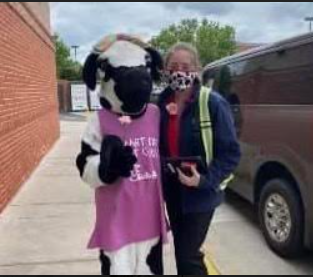
The goal of this program is to give students the opportunity to leave school and go to work. This allows students to practice concepts and skills that are taught in class while also earning money.
Senior Kelly Teague is involved in the Co-op program at the high school. Kelly works at Barone’s Tuscan Grill in Moorestown. Through the Co-op program, Teague is able to leave school early so she can work more hours and earn more money.
“Participating in Co-op has pushed me to pick up more hours working which has given me a bigger responsibility with balancing school, work, and sports,” Teague said.
According to Bond, minimum-wage jobs in food or retail tend to be the most popular among high school students. Local businesses and employers reach out to Bond with job opportunities for high school students. Bond keeps an updated list of available openings on his website, myhighschooljob.com. He regularly updates this website with job opportunities from businesses that he is in touch with.
Bond said the economic environment that COVID-19 has created has had a big impact on teenage jobs.
“If anything there’s more jobs available,” Bond said. “Especially coming out of the pandemic, other people have let’s say left and got retrained and went to different places.”
As a result, this left a lot of entry-level jobs open for teenagers, as many businesses are now struggling to find people to work. Currently, there are many opportunities for students to get jobs because employers are still trying to fill the void of employees that left during the pandemic.
For example, according to myhighschooljob.com, there are current openings at Primo Hoagies in Cinnaminson, Pinsetters Bowling Alley in Maple Shade, Riggins Automotive in Cinnaminson, and more. The website includes jobs ranging from after-school babysitting to office assistants at law and medical offices.
For those currently looking for a job, Bond has some advice.
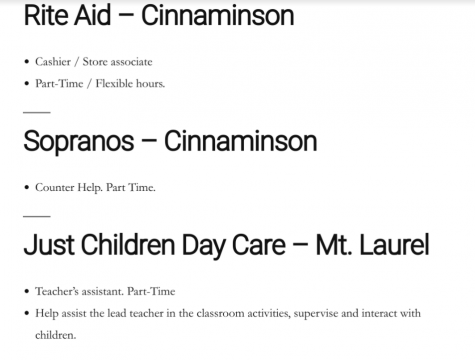
“Don’t procrastinate,” Bond says in regard to his biggest piece of advice for finding a job. “Be patient, it does take time. You are not always going to get the first job you apply to. In many cases, it could take months before you actually start.”
Many CHS students have taken this advice and have successfully gotten a job, while others are waiting until after graduation to explore the business world.
”I wanted to make my own money, and I thought it was important in learning responsibility and working with others,” senior Grace Ringer, a cashier at Wegmans, said.
While it may take months to secure a job, Ringer said the application process was not too hard.
“I only had to answer a few questions to apply,” she said. “Then I had a phone interview. This all happened in the course of two weeks so it was fairly easy to get the job.”
While having a job in high school allows students to make money, it can also help students learn interpersonal skills.
“Just getting over that fear of being interviewed and trying to do your best for everyone,” sophomore Madison Willers said, is the hardest part about getting a job.
Having a job was more than just about making money for junior Katelyn Cammarota. She gained valuable experience from her job. She said it has boosted her confidence in certain situations.
“I learned how to use my own voice,” Cammarota said.
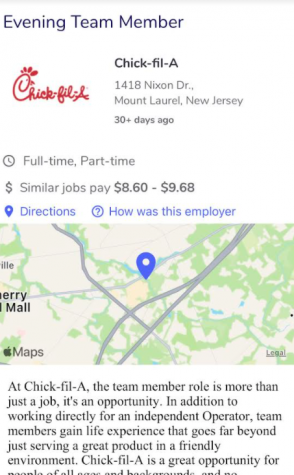
Although the job search and application process can be frustrating and time-consuming, junior Maddy Luban sped up the process by using other resources, such as apps that connect you with job openings and applications. She used Snagajob, which is an app that connects users with jobs based on their profile. On Snagajob, your profile is your application, making the application process quick and easy.
“When I applied, I did so on the app Snagajob, where I was then called to come into the restaurant for an interview,” Luban says.
Willers works with Luban at Chick-fil-a. Besides gaining experience, Willers enjoys her job since she works with a friend.
“I think it’s nice having someone you know when you work so you don’t feel like an outcast,” Willers said. “Having a friend just makes the job more fun!”
While some students look to jobs to help prepare themselves for after high school and even college, other students refrain from working a job to focus on schoolwork and grades. Juggling clubs, sports, hobbies, school, and a job can be overwhelming.
“I don’t have a job because I spend most of my time doing schoolwork or participating in clubs,” junior Delaney Imondi said.
Similar to Imondi, junior Sriram Elango said he is investing in his current education to get a job later on, such as in college.
“I want to focus more on learning as much as I can during high school and studying topics I am interested in outside of school since it will get me better jobs in the future,” Elango said.
The pandemic also made getting a job complicated. Uncertainty and not being able to get vaccinated held some back while others experienced little change to their jobs.
“COVID affected my decision [to not get a job] because when I was unvaccinated I didn’t want to unnecessarily expose myself or potentially contract the virus,” Imondi said.
Ringer, on the other hand, has found that COVID-19 has not made a significant change to her job.
“Other than wearing masks, COVID has not really affected my job,” Ringer said. “It is a little difficult to have an actual connection with customers because you can’t see faces, but it doesn’t really cause an issue.”
Whether it be navigating finding a job or tackling COVID complications, the business curriculum is designed to help students put their best foot forward.

